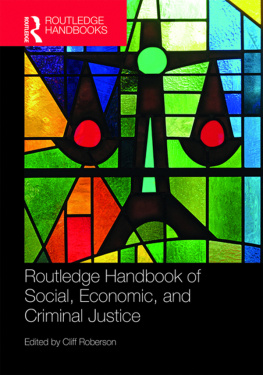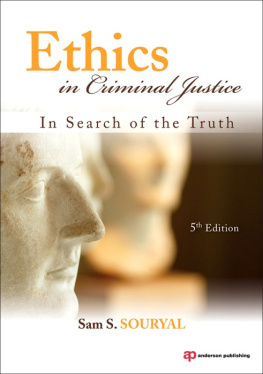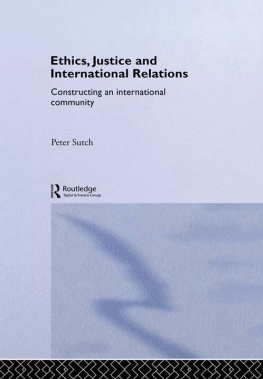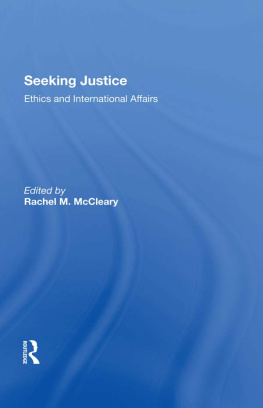
This innovative book is essential reading for anyone seeking a rich social scientific understanding of ethics in this current era.
Walter DeKeseredy, Anna Deane Carlson Endowed
Chair of Social Sciences and Director of the
Research Center on Violence at
West Virginia University, USA
Sharon Hayes provides a fresh, new approach to teaching criminal justice ethics. Beginning with strong foundational material covering what is ethics and why we should be ethical, she then moves on to societal ethics and morality. In contrast to most ethics textbooks, it is only after giving the reader this essential baseline that she then addresses situational ethics for law enforcement, courts and corrections. In a society that frequently questions individual and group ethics, this book helps bring much needed clarity and understanding.
Michael B. Shapiro, J. D.,
Clinical Instructor and Criminal Justice
Coordinator at the Alpharetta Center,
Georgia State University, USA
Hayes Criminal Justice Ethics text offers instructors of undergraduate criminal justice ethics courses the ability to provide students with a dynamic understanding of ethics by illustrating its evolution throughout humanity and how that history has informed ethical principles within the field of criminal justice.
Elizabeth Quinn, Ph.D., Associate Professor,
Department of Criminal Justice,
Fayetteville State University, USA
Criminal Justice Ethics
It is essential for those employed within the justice system to be able to competently and confidently work at the borders between ethics and the law. Criminal Justice Ethics offers a fresh new approach to considering ethical issues in a criminal justice context. Rather than simply offering a range of ethical dilemmas specific to various justice professionals, it provides extensive discussion of how individuals develop their moral imaginations using ethical perspectives and practices, both as citizens of the world and as practitioners of justice.
Starting from a consideration of the major ethical theories, this book sets the framework for an expansive discussion of ethics by moving from theory to consider the just society and the role of the justice professional within it. Each chapter provides detailed analysis of relevant ethical issues and activities to engage students with the content, as well as review questions which can be used for revision or examination. This book will help students to:
understand the various theoretical approaches to ethics;
apply these understandings to issues in society and the justice process;
assist in developing the ability to investigate, discuss, and analyze current ethical issues in criminal justice;
appreciate the diverse nature of ethical systems across cultures;
outline strategies for detecting and resolving ethical dilemmas.
Rich with examples and ethical dilemmas from a broad range of contexts, this books multicultural approach will appeal not only to criminal justice educators, but also to academics, students, and practitioners approaching criminal justice from sociological, psychological, or philosophical perspectives.
Sharon Hayes is Associate Professor in Justice at Queensland University of Technology (QUT) where she teaches Social Ethics and the Justice System and Sex and Crime. Her background in ethics and justice spans twenty-five years, including a Masters in Philosophy from Tulane University, and a PhD in Social Philosophy from QUT. Sharon was a founding lay member of the Queensland Legal Practice Tribunal and has provided advice on public sector ethics to the Crime and Misconduct Commission. Sharons recent research interests include sex crimes and domestic violence and her recent publications include Sex, Crime and Morality (2012, Routledge), The Politics of Sex Trafficking: A moral geography (2013, Palgrave), and Sex, Love and Abuse: Discourses on domestic violence and sexual assault (2014, Palgrave).
Criminal Justice Ethics
Cultivating the moral imagination
Sharon Hayes
First published 2015
by Routledge
2 Park Square, Milton Park, Abingdon, Oxon, OX14 4RN
and by Routledge
711 Third Avenue, New York, NY 10017
Routledge is an imprint of the Taylor & Francis Group, an informa business
2015 Sharon Hayes
The right of Sharon Hayes to be identified as author of this work has been asserted by her in accordance with sections 77 and 78 of the Copyright, Designs and Patents Act 1988.
All rights reserved. No part of this book may be reprinted or reproduced or utilized in any form or by any electronic, mechanical, or other means, now known or hereafter invented, including photocopying and recording, or in any information storage or retrieval system, without permission in writing from the publishers.
Every effort has been made to contact copyright holders for their permission to reprint the extracts and images that feature in this book. However, the publishers would be happy to hear from any copyright holder who is not acknowledged here and will undertake to rectify any errors or omissions in future editions of this book.
British Library Cataloguing in Publication Data
A catalogue record for this book is available from the British Library
Library of Congress Cataloging-in-Publication Data
A catalog record has been requested for this book
ISBN: 978-1-138-77696-8 (hbk)
ISBN: 978-1-138-77697-5 (pbk)
ISBN: 978-1-315-77289-9 (ebk)
Typeset in Bembo
by Swales & Willis Ltd, Exeter, Devon, UK
Additional materials are available on the companion website at www.routledge.com/cw/Hayes
For my parents, Richard William Beattie and Aileen Joan Beattie.
Contents
This book could not have been written without the input of the many students to whom I have taught ethics over the past twenty years. The lively class discussions have assisted in honing and enriching both content and style, and I thank them with all my heart. Id like to thank my tutors, Bridget Thomas, Bethney Baker, Luke Trantor, Carol Quadrelli, and Rob Robertson for their invaluable input. Im also appreciative of discussions about the material with Matthew Ball, who co-taught it with me from 2010 through 2012. Thanks also to Olivia Hayes for keeping me updated on ethics in the media, and to Cathy Rayner for transcribing some of my lectures. Extra thanks must also go to Cathy and Olivia who, as my family, have provided invaluable support and cups of tea during the writing of this book. Thanks also to OUP for their kind permission to reproduce some of my previous work in . Finally, thanks to the editors at Routledge, particularly Heidi Lee, for their ongoing patience and unfailing good humor!
This book is about the ethical and moral issues that impact upon those who work in, and those who access, the criminal justice system. It is more than just a professional code of conduct or even an exploration of how ethics can be applied to professional roles, although those are important parts. This text aims to broaden your thinking about the criminal justice system, how it is structured and how it fits into society at large. It introduces the term social ethics, which illustrates the impact of the criminal justice system on specific populations, particularly those who are disadvantaged. It also demonstrates how public and private morality play such a large role in conceptualizations of ethics.







